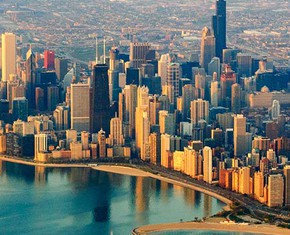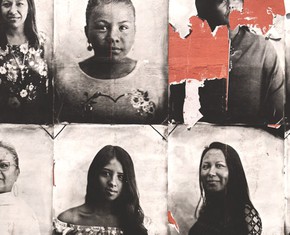The views expressed in our content reflect individual perspectives and do not represent the authoritative views of the Baha'i Faith.
The Baha’i teachings make the remarkable claim that “The time has come when all mankind shall be united.”
That striking declarative sentence, uttered by Abdu’l-Baha in a talk he gave at the Metropolitan Temple in New York City in May of 1912, challenged the church’s congregation—and the whole world:
The time has come when all mankind shall be united, when all races shall be loyal to one fatherland, all religions become one religion, and racial and religious bias pass away. It is a day in which the oneness of humankind shall uplift its standard and international peace, like the true morning, flood the world with its light. – Abdu’l-Baha, The Promulgation of Universal Peace, p. 153.
Since Abdu’l-Baha advanced this startling concept in the early years of the 20th century, a whole host of objective evidence has certainly pointed us in that direction.
The world has become a neighborhood; after global wars the community of nations formed and sustained the United Nations; the diverse cultures of the planet have become better and better known to each other; intermarriage across racial, religious and class boundaries has increased exponentially; and the idea of world citizenship has exploded into planetary consciousness. In music, art, literature, drama and every other form of creative human endeavor, human unity has emerged as a universal theme. In both evolutionary and revolutionary ways, the Universal House of Justice later wrote, human unity will inevitably signal humanity’s “long-awaited coming of age:”
The Baha’i Faith regards the current world confusion and calamitous condition in human affairs as a natural phase in an organic process leading ultimately and irresistibly to the unification of the human race in a single social order whose boundaries are those of the planet. The human race, as a distinct, organic unit, has passed through evolutionary stages analogous to the stages of infancy and childhood in the lives of its individual members, and is now in the culminating period of its turbulent adolescence approaching its long-awaited coming of age. – The Promise of World Peace, The Universal House of Justice, p. 1.
What does this organic evolutionary process look like from a long-term historical perspective? Baha’is believe that human history has developed in a series of stages, much as the evolution of a single human being develops—from infancy to childhood to adolescence and finally to adulthood:
Unification of the whole of mankind is the hall-mark of the stage which human society is now approaching. Unity of family, of tribe, of city-state, and nation have been successively attempted and fully established. World unity is the goal towards which a harassed humanity is striving. Nation-building has come to an end. The anarchy inherent in state sovereignty is moving towards a climax. A world, growing to maturity, must abandon this fetish, recognize the oneness and wholeness of human relationships, and establish once for all the machinery that can best incarnate this fundamental principle of its life. – Shoghi Effendi, The World Order of Baha’u’llah, p. 202.
Human beings first unified, in the Stone Age, in small family groups. From that stage small tribes eventually developed, and we shifted our loyalties to a tribal affiliation. The adaptation of agriculture brought an end to much of the nomadic hunter-gatherer groups, and led to the consequent development of the city-state, which ultimately evolved into kingdoms and nations.
But those stages of collective human development also brought about systematic patterns of bias and prejudice. Tribal cultures often pitted one tribe against another, based on the idea that our tribe is good, but yours is evil. Raiding, violent conflicts and even long-term patterns of war emerged as a result. Those patterns of bias, prejudice and contention continued in each stage of human organization and governance, eventually pitting entire nations, races and religions against each other:
… the establishment of various nations and the consequent shedding of blood and destruction of the edifice of humanity result from human ignorance and selfish motives.
As to the patriotic prejudice, this is also due to absolute ignorance, for the surface of the earth is one native land. Every one can live in any spot on the terrestrial globe. Therefore all the world is man’s birthplace. These boundaries and outlets have been devised by man. In the creation, such boundaries and outlets were not assigned. Europe is one continent, Asia is one continent, Africa is one continent, Australia is one continent, but some of the souls, from personal motives and selfish interests, have divided each one of these continents and considered a certain part as their own country. God has set up no frontier between France and Germany; they are continuous. Yea, in the first centuries, selfish souls, for the promotion of their own interests, have assigned boundaries and outlets and have, day by day, attached more importance to these, until this led to intense enmity, bloodshed and rapacity in subsequent centuries. In the same way this will continue indefinitely, and if this conception of patriotism remains limited within a certain circle, it will be the primary cause of the world’s destruction. No wise and just person will acknowledge these imaginary distinctions. Every limited area which we call our native country we regard as our motherland, whereas the terrestrial globe is the motherland of all, and not any restricted area. – Abdu’l-Baha, Selections from the Writings of Abdu’l-Baha, pp. 299-300.
The world’s current social and political environment, still conflict-ridden and dis-unified, can lead people to think that unity is just a mirage, an idealistic goal we will never reach. The biases and prejudices we still witness on a daily basis can further deepen this sense of pessimism about the future. But the Baha’i teachings ask us to step back, look at the bigger picture, and recognize the inevitable and ultimately irresistible macrocosmic movement of our species toward unification:
Who can doubt that such a consummation—the coming of age of the human race—must signalize, in its turn, the inauguration of a world civilization such as no mortal eye hath ever beheld or human mind conceived? Who is it that can imagine the lofty standard which such a civilization, as it unfolds itself, is destined to attain? Who can measure the heights to which human intelligence, liberated from its shackles, will soar? Who can visualize the realms which the human spirit, vitalized by the outpouring light of Baha’u’llah, shining in the plenitude of its glory, will discover? – Shoghi Effendi, The World Order of Baha’u’llah, p. 206.
















Comments
Sign in or create an account
Continue with Googleor